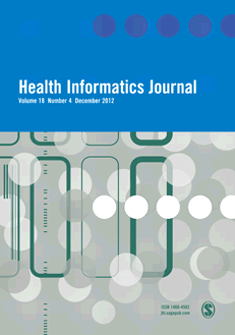
Health Informatics Journal
Scope & Guideline
Fostering excellence in health informatics communication.
Introduction
Aims and Scopes
- Healthcare Data Analytics and Machine Learning:
The journal frequently publishes studies that leverage machine learning and data analytics to improve healthcare outcomes, such as predicting disease progression, optimizing treatment plans, and enhancing patient safety. - Digital Health Technologies:
Research related to the development and evaluation of digital health technologies, such as mobile health applications, telemedicine, and electronic health records (EHRs), is a core focus area. - Patient-Centered Care and Health Information Exchange:
The journal emphasizes the importance of patient engagement and preferences in health information exchange, exploring how technology can empower patients in their healthcare decisions. - Public Health Informatics:
Studies that apply informatics principles to public health challenges, including epidemic tracking and health promotion through digital interventions, are prominently featured. - Ethics and Policy in Health Informatics:
The journal addresses ethical considerations and policy implications related to the use of health informatics technologies, fostering discussions on privacy, data security, and equitable access.
Trending and Emerging
- Artificial Intelligence and Machine Learning in Healthcare:
There is a marked increase in studies utilizing AI and machine learning for various applications, including predictive analytics, diagnostic tools, and personalized medicine, indicating a trend towards more sophisticated data processing and decision support systems. - Telehealth and Remote Monitoring Solutions:
Research focusing on telehealth, particularly in the context of the COVID-19 pandemic, has surged, emphasizing the need for effective remote monitoring and virtual care solutions. - Interoperability and Data Integration:
A growing emphasis on interoperability among health information systems is evident, with studies exploring how different systems can communicate and share data effectively to improve patient care. - Patient Engagement and Self-Management:
Emerging themes include the exploration of patient engagement technologies and self-management tools that empower patients to take an active role in their health, reflecting a shift towards patient-centered care. - Health Informatics Ethics and Governance:
There is an increasing focus on the ethical implications of health informatics, including privacy concerns, data security, and the governance of health information, as these issues become more critical in the digital age.
Declining or Waning
- Traditional Health Information Systems:
Research on conventional health information systems, such as basic EHR implementations without advanced analytics or AI integration, has become less frequent as the field shifts towards more innovative and integrated solutions. - General Health Education and Awareness Campaigns:
Studies focused solely on general health education without a technological component or specific health informatics applications are less common, as the emphasis has shifted to technology-enhanced strategies. - Standalone Mobile Apps Without Integration:
The publication of research on standalone mobile health applications that do not integrate with broader health systems or data streams has decreased, highlighting a trend towards integrated digital health solutions.
Similar Journals

Healthcare Technology Letters
Pioneering breakthroughs in healthcare technology research.Healthcare Technology Letters is a leading open-access journal published by WILEY that has been at the forefront of disseminating cutting-edge research in the field of health informatics and health information management since its inception in 2014. With an E-ISSN of 2053-3713, this esteemed journal is recognized for its commitment to advancing knowledge and practice in healthcare technology, making it a vital resource for researchers, professionals, and students alike. The journal's scope encompasses a wide range of topics, including digital health solutions, data management, and innovative technologies that enhance patient care. It holds a respectable position in the academic community, featuring a Q3 ranking in both health informatics and health information management as of 2023, and consistently contributing to high-impact research evidenced by its Scopus rankings. By providing open access to its content since 2017, Healthcare Technology Letters ensures that valuable insights and breakthroughs can reach a broader audience, furthering the impact of its published work on the global health landscape.
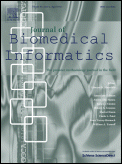
JOURNAL OF BIOMEDICAL INFORMATICS
Unlocking the potential of informatics in healthcare.JOURNAL OF BIOMEDICAL INFORMATICS, published by Academic Press Inc. Elsevier Science, is a premier peer-reviewed journal dedicated to the integration of computer science and health informatics to advance the field of biomedical engineering and healthcare. With its ISSN 1532-0464 and E-ISSN 1532-0480, this influential journal has established itself with an impressive impact factor, reflecting its high-quality research contributions. Recognized within the top quartile (Q1) of both Computer Science Applications and Health Informatics for 2023, the journal ranks #135 out of 817 in Computer Science Applications and #25 out of 138 in Health Informatics according to Scopus metrics. Offering open access options, it fosters extensive dissemination and accessibility of groundbreaking research findings to the scientific community. As a scholarly platform from 2001 to 2024, it is engineered to cater to the educational needs of researchers, professionals, and students, promoting innovative studies that bridge the gap between technology and healthcare.

TECHNOLOGY AND HEALTH CARE
Transforming Healthcare with Cutting-Edge SolutionsTECHNOLOGY AND HEALTH CARE, published by IOS PRESS, stands as a prominent interdisciplinary journal dedicated to the integration of technology within the healthcare sector. With an ISSN of 0928-7329 and an E-ISSN of 1878-7401, this journal has been a vital resource since its inception in 1993, providing insights and advancements in various categories including bioengineering, biomedical engineering, health informatics, and more. Though it currently holds a Q4 classification in several fields and Q3 in others, it actively contributes to the dialogue surrounding innovative methodologies and practices that enhance healthcare delivery. Researchers, professionals, and students will find the journal invaluable for its diverse range of studies that explore the convergence of technology and health. Its commitment to fostering impactful research continues to reinforce its relevance in the evolving landscape of healthcare technology.
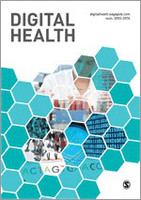
Digital Health
Pioneering the Digital Frontier of Health and Medicine.Digital Health is a pioneering open-access journal published by SAGE Publications Ltd, dedicated to advancing the field of health technology and its intersection with health policy, informatics, and the broader medical landscape. Since its inception in 2015, the journal has rapidly established itself as an essential resource for researchers, professionals, and students, serving as a platform for innovative research that leverages digital tools to improve health outcomes. Currently ranked in the Q2 category across four relevant domains, including Computer Science Applications and Health Informatics, it commands respect within the academic community. With its accessible framework, Digital Health facilitates the dissemination of critical findings and new methodologies that inform policy and practice. The journal’s commitment to open access promotes worldwide access and cooperation, making significant contributions to the evolving landscape of digital health.
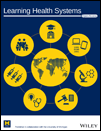
Learning Health Systems
Advancing healthcare through innovative insights.Learning Health Systems is a premier open access journal published by WILEY that has been at the forefront of innovation in the fields of Health Informatics, Health Information Management, and Public Health since its inception in 2016. With a dedicated focus on the intersection of clinical practice and health technology, this journal is pivotal for researchers, professionals, and students seeking to advance the knowledge base in these critical areas. The journal enjoys a robust reputation, boasting a Q1 ranking in multiple categories as of 2023, and ranking within the top percentiles in both Medicine and Health Professions across various metrics. Designed to foster collaboration and dissemination of cutting-edge research, Learning Health Systems is committed to bridging gaps between data science and practical health applications while providing an accessible platform for transformative ideas. It invites contributions that challenge existing paradigms and promote innovative solutions that enhance healthcare delivery and patient outcomes.
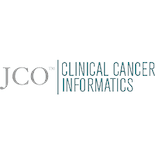
JCO Clinical Cancer Informatics
Transforming oncology with cutting-edge data solutions.Welcome to JCO Clinical Cancer Informatics, an esteemed journal at the forefront of the intersection between oncology and health informatics. Published by Lippincott Williams & Wilkins, this journal is dedicated to advancing the understanding and application of cancer data through innovative informatics solutions. Since its inception in 2017, JCO Clinical Cancer Informatics has established itself as a critical resource for researchers, practitioners, and students, as evidenced by its high rankings in the 2023 Scimago Quartiles—Q2 in Cancer Research and Q1 in both Health Informatics and Oncology. With a commitment to open access, this journal aims to disseminate groundbreaking research findings that enhance cancer care and inform public health strategies. Positioned in the United States, it serves as a pivotal platform for sharing knowledge and fostering collaboration within the global cancer research community.
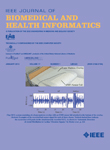
IEEE Journal of Biomedical and Health Informatics
Advancing the Intersection of Technology and HealthcareIEEE Journal of Biomedical and Health Informatics is a premier publication dedicated to advancing the field of biomedical and health informatics. Published by the esteemed IEEE-Inst Electrical Electronics Engineers Inc, this journal boasts a notable impact within various disciplines, ranking in the top quartile (Q1) across key categories such as Biotechnology, Computer Science Applications, Electrical and Electronic Engineering, Health Informatics, and Health Information Management as of 2023. With a strong Scopus ranking—placing it at #11 in Health Informatics and #6 in Health Information Management—it serves as a vital resource for cutting-edge research and innovative practices. Open Access options enhance accessibility, fostering collaboration among researchers, professionals, and students. Since its inception in 2013, the journal has been committed to publishing high-quality, peer-reviewed articles that explore the pivotal intersection between technology and healthcare, thereby contributing significantly to the evolution of medical practices and patient care.

Healthcare
Empowering healthcare solutions with cutting-edge insights.Healthcare is an esteemed academic journal published by MDPI, dedicated to advancing the field of health and medical sciences since its establishment in 2013. Operating from Switzerland, this Open Access journal aims to provide a platform for high-quality research that spans critical disciplines such as Health Informatics, Health Information Management, Health Policy, and Leadership and Management. With a 2023 Impact Factor reflected in its Q3 and Q2 rankings across various categories, Healthcare not only offers visibility and accessibility to innovative research but also fosters collaboration among researchers, professionals, and students dedicated to improving global health outcomes. The journal's commitment to disseminating knowledge and its diverse range of topics make it an essential resource for anyone involved or interested in the continuous evolution of health systems and practices, positioning it as a vital contributor to the future of health research.
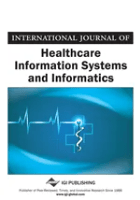
International Journal of Healthcare Information Systems and Informatics
Fostering dialogue on critical healthcare informatics advancements.International Journal of Healthcare Information Systems and Informatics is a prestigious academic journal published by IGI Global, focusing on the vital intersection of healthcare and information technology. With an ISSN of 1555-3396 and E-ISSN of 1555-340X, this journal serves as a pivotal platform for researchers, professionals, and students to explore innovative solutions and advancements in healthcare informatics. As of 2023, it holds a commendable Q3 ranking in categories such as Information Systems and Medicine, highlighting its significant contribution to the academic community. Covering a wide range of topics from healthcare data management to the implementation of information systems in clinical settings, the journal aims to foster critical discussions and disseminate impactful research. With a publication history spanning from 2006 to 2024, it continues to play a crucial role in guiding the future of healthcare information systems. Readers can access this journal through traditional subscription methods, ensuring that leading-edge research reaches those most invested in the evolution of healthcare informatics.

INFORMATION RESEARCH-AN INTERNATIONAL ELECTRONIC JOURNAL
Pioneering Insights for a Global Information Community.INFORMATION RESEARCH - AN INTERNATIONAL ELECTRONIC JOURNAL is a distinguished open-access journal published by the University of Sheffield's Department of Information Studies, situated in England. Since its inception in 1995, the journal has been at the forefront of disseminating research findings in the field of Library and Information Sciences, earning a commendable Q2 ranking in the category for 2023. With an ISSN of 1368-1613 and an E-ISSN of 1368-1613, it serves as a vital resource for scholars, practitioners, and students alike, providing a platform for innovative insights and engaging discussions. The journal accepts submissions from diverse perspectives related to the information research domain and contributes to the ongoing dialogue among academic professionals worldwide. With a Scopus ranking placing it at 150 out of 280 in its field, this publication underscores its importance in shaping the future of information studies while enabling wide accessibility to cutting-edge research.